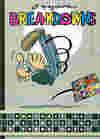| In this large-format book the creator of the Pulitzer Prize–winning graphic novel Maus explores the comics form and how it formed his own artistic sensibilities. The two-part volume contains a reprint of Breakdowns, a rare, self-published 1978 collection of Art Spiegelman's artistically informed (and highly neurotic) comics, which included the prototype of Maus, various cubist experiments, and the genre-twisting pulp story "Ace Hole—Midget Detective." Spiegelman also adds 28 pages of new autobiographical material, inspired by his reacquaintance with the 30-year-old book, his Auschwitz-haunted relationship with his father and mother, and the neuroses he passed on to his own son.
"This reprint of Spiegelman's 1978 collection of comics is a must-have for any comics aficionado, art-house dude, hipster or anyone who ever thought to himself, 'Hmm, comics are kinda cool.' It will also be liked by anyone who ever enjoyed Kafka or anything postmodern enough to be in McSweeney's. There's still enough here for regular people to enjoy, too. The 30-page memoirish introduction, all done in comics (in which we get to see Spiegelman mess up his son's mind the way his was messed up) explains how comics came to be the shining light for so many messed-up adolescent boys: 'Mad warped a generation in the bland American 1950s—something that's been done before, but possibly not so well.' The early comics are a revelation. Spiegelman gives us the story that led to Maus, and we see how he evolved from an R. Crumb-loving artist with neuroses pertaining to The Dick Van Dyke Show to a tight storyteller of anxious, modern folktales. One of the functions of the artist is to take us to hell and get us out in one piece. Spiegelman's early trips into hallucinatory darkness do this. We come out in one piece; it's not clear he did."—Publishers Weekly (starred review)
|

